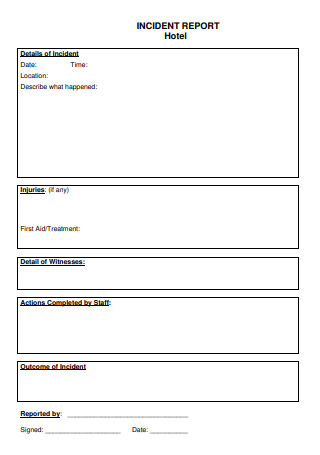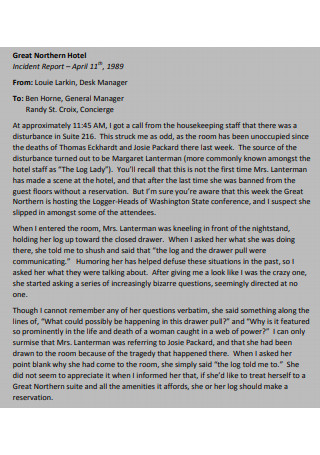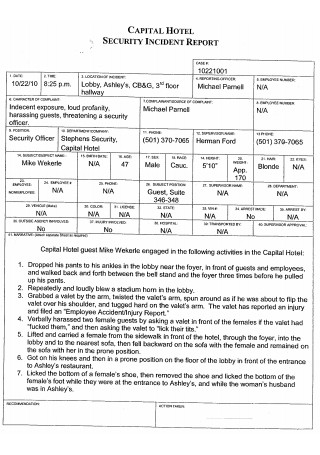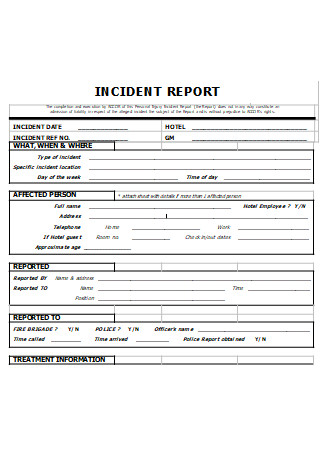3+ Sample Hotel Incident Report
FREE Hotel Incident Report s to Download
3+ Sample Hotel Incident Report
What is a Hotel Incident Report?
Why Should All Incidents And Accidents Be Reported?
What Needs to Be Included in a Hotel Incident Report?
How to Format a Hotel Incident Report?
Additional Reasons to Report Incidents
Tips to Keep your Hotel Safe
Other Types of Incident Reports
FAQs
What is an accident?
What is the purpose of hotel incident reporting?
Why is it important to record incidents?
What is a Hotel Incident Report?
According to Safeopedia, an unplanned event that disrupts regular operations is referred to as an incident in the context of occupational health and safety. The intensity of the incidents varies from near misses to fatalities. Connecting that with the hotel incident form, the primary location being the hotel where the incident took place and the immediate commotion within the surrounding area that occurred. A hotel incident report mainly records the aftermath of the incident and gathering the witnesses for their statements and collecting the tangible pieces of evidence to add and help verify the report.
Why Should All Incidents And Accidents Be Reported?
There are economic benefits in addition to the basic reporting obligations that motivate most companies to establish a strong reporting system. The majority of incident reporting methods fall under the category of money spent only as an operational expenditure. Most companies would want to avoid additional reasons to spend their money and so do their best to avoid hotel incidental charges. Though, if the evidence points to their mistake on the matter, hotels would surely begin working on Maintenance Forms to improve the experience their guests had and shell out that necessary budget to achieve such improvements.
What Needs to Be Included in a Hotel Incident Report?
Keeping your hotel incident report accurate may be a challenging thought. You may even be confused about where to start and what information is important enough to gather. Understanding the many types of details of data you may need to collect during the hotel incident reporting process helps you narrow down the necessary information you should be gathering. Here’s a list of facts to keep in mind when you’re documenting an incident:
How to Format a Hotel Incident Report?
The information in a hotel incident report may be presented differently based on a variety of circumstances. As a general rule, incident reports should be written in the third person since the goal is to be impartial and objective, only providing facts and eliminating views and prejudices. View the templates that were provided in this article to see various hotel incident report examples that you can use as a basis.
Step 1: Provide the Relevant Information
The introduction in your hotel incident report must be the essential and the most relevant information, you can use the four Ws (who, what, when, and, where) as a guide to know which detail you should prioritize. Make sure to include the names of the people that were affected by the incident. If their identification cards are missing or you are unable to identify their names, you can instead state their role in relation to the incident. You also have to be able to summarize the incident in three sentences or less.
Take note of the exact or near estimate of the time and date of the occurrence. As well as the location of the incident and as much as possible be exact with that detail.
Step 2: Expound More of the Details
In the second step, you will need to elaborate more on the details that were written in the introduction portion. Write the events prior to the incident and then the incident itself in chronological order to avoid confusion. Make sure to explain comprehensively the four Ws that were mentioned in the earlier step.
Step 3: Aftermath of the Incident
Is the situation under control? How? Explain in detail the measures and actions that were done in addressing the incident and as well as how long it took.
If the issue has not been resolved, explain why and what measures need to be taken to address it. State the intentions and plans of the hotel or company personnel to alleviate the affected lives that were involved and the situation of the incident itself. Creating a Safety Plan may help outline the intended plans.
Step 4: Add Signatures
Include the incident report writer’s complete name and signature for accountability and record-keeping. This is merely to provide authentication that the information written out in the document is valid. And if the authorities were to have any other inquiries, then they know who to approach for additional information or explanation.
Additional Reasons to Report Incidents
If you are still not convinced of the importance of a hotel incident report, then we have listed additional reasons to show you why you must write out incidents. According to Technical Safety, there are four main reasons why you should report incidents and hazards. And they are:
Tips to Keep your Hotel Safe
Nobody wants to stay in a shady and dangerous hotel when they intentionally wanted to get away from the stress of their usual environment and take a breather from their usual schedule. People want to go to hotels in order to relax and unwind but if your hotel is not satisfactory enough, guests may opt to stay elsewhere. To avoid such situations, Hotel Management provides 5 ways to ensure your hotel guests and employees would feel much safer within your hotel premises.
Other Types of Incident Reports
There are numerous other types of incident reports, some are:
FAQs
What is an accident?
While an incident is sometimes used interchangeably with the term accident, it refers to a distinct subject. Accidents are a subset of occurrences, although certain non-accidental events are also recorded as incidents. See Accident Reports for an example and see for yourself the difference.
What is the purpose of hotel incident reporting?
A hotel incident report can be used to investigate and analyze a situation. It contains the fundamental cause but also corrective steps to eliminate the risks and prevent such occurrences in the future. Hotel incident report letters can also be utilized as safety papers, indicating possible dangers and uncontrollable hazards discovered on the job.
Why is it important to record incidents?
It is important to record incidents, especially on the hotel premises so that authorities can review them in great detail through an incident investigation.
Training your hotel staff is important in all aspects that involve the hotel, whether it be escape routes, providing first aid, or being quick in contacting authorities to handle dangerous cases. Employee incidents are best avoided but in cases that the incident was not expected or overseen, then knowing how to write a hotel incident report can smooth out details with the authorities as well as the people affected.




